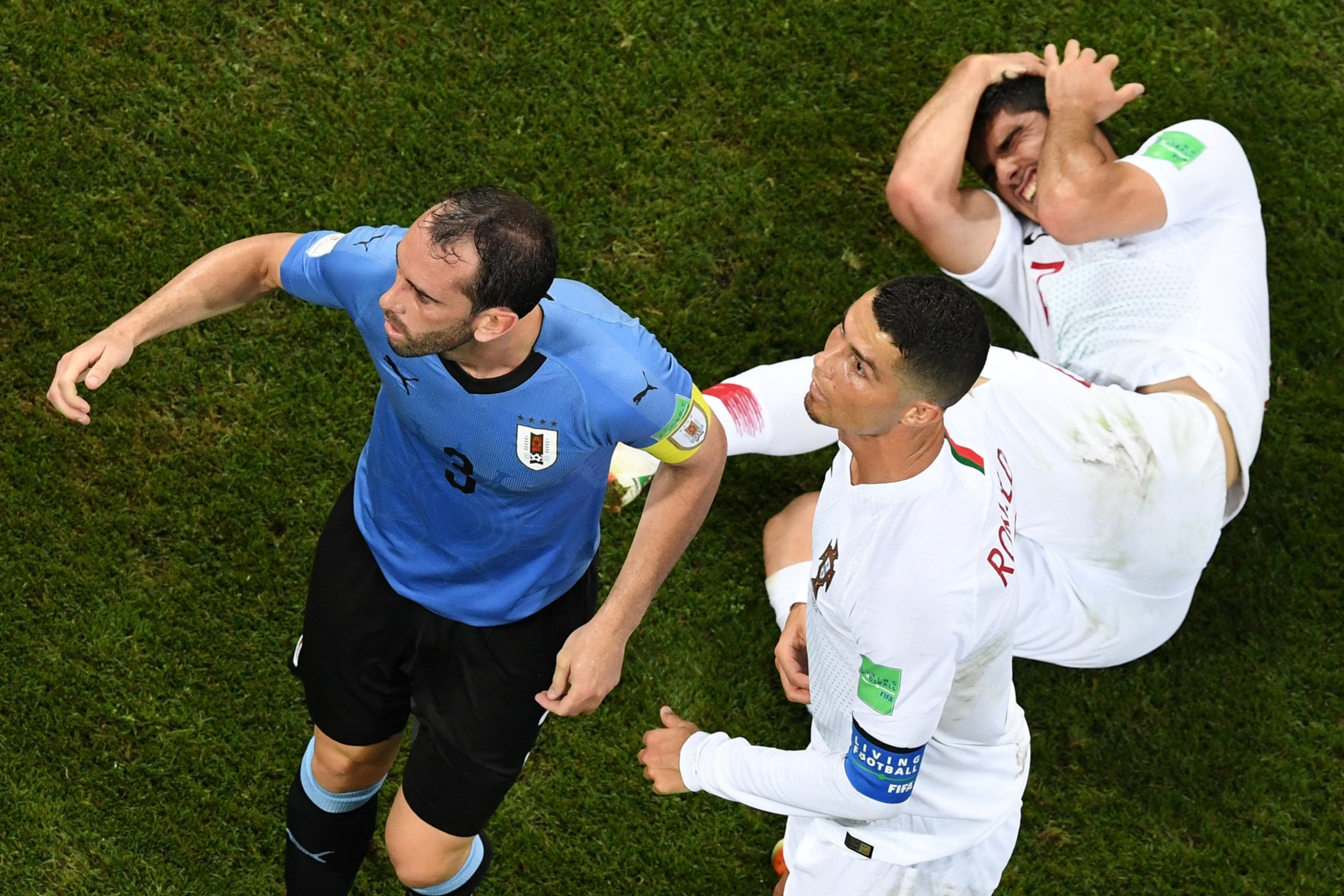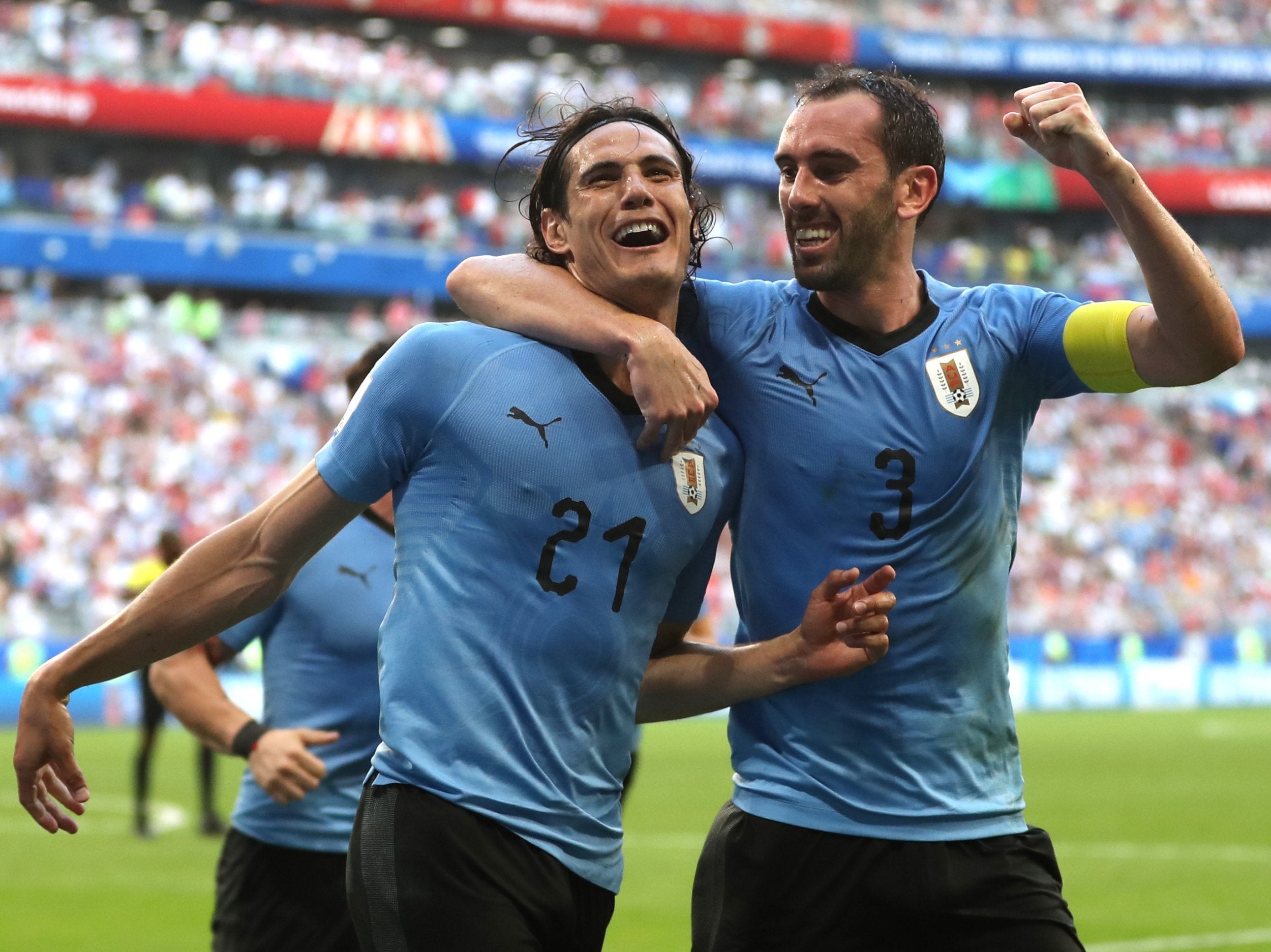World Cup 2018: France tasked with breaking a Uruguay defence that is close on the pitch but even closer off it
France may have the most exciting attackers, but Uruguay breed the sternest defenders
It was an imperfect moment from Uruguay, but thereby a perfect illustration of why they are so obdurately tough to play against. In the 81st minute of their last-16 match against Portugal, substitute Carlos Sanchez had attempted to relieve the increasing pressure with a surge and pass forward, only to play the ball straight to a white shirt. Not that Sanchez saw where it ended. From the millisecond the midfielder realised his pass was wayward, he immediately turned and sprinted at full pelt back to position, to again fully bolster the defence that was about to face another forward drive.
There was no attempt to press and win the ball back. Sanchez instantly knew where he needed to be, and he didn’t need to wait.
Such supremely drilled discipline is one reason why Uruguay have only conceded one goal in 2018, why they may well have the best defence in international football right now, and why France may well have to wait a long time for any kind of breakthrough in Friday’s first quarter-final.
Didier Deschamps, at least, is well aware of how long an evening this could be. France will not get the gifts they did against Argentina.
“This Uruguay side has a very different profile to Argentina,” Deschamps said at Nizhny Novgorod on Thursday. “We will have to be patient. They are extremely organised in defence, they don’t concede many goals. But they also know how to attack and they’re very good with their counters. They switch from defence to attack with a direct style of play that’s really admirable, and have two extremely talented strikers. We need to be patient but we’ll need to have more than patience if we’re going to beat them.”
That is because there is so much more to Uruguay’s defensive solidity than just defending, just as there feels so much to the potential of the entire football team than a pool of a mere 3.4m people. The country’s recent resurgence as a regularly competitive side again marks them out as by far the greatest overachievers in their international game, but it is built on the sturdiest foundations: their structures and these consistently concrete-like backlines that continuously produces centre-halves like Diego Godin and Jose Gimenez. Just as conspicuously, they are centre-halves not really being produced in Europe.
That is part of a wider debate, but the relevant point with Uruguay is that they don’t develop players through the more homogenised and hermetically sealed academies seen on this side of Atlantic. There are also their uniquely intense youth leagues, where winning and losing really means something, and matches can get ferocious. This - as Arsene Wenger has long argued - means clubs aren’t just producing universalist midfielders, while the “fight” of fixtures shapes players in other ways and means they gradually learn the less coachable qualities required for strikers and centre-halves.
You might call it Godin’s law. The longer a player is exposed to such battles, the more likely it is he will develop abilities the academies don’t mention. The type of young defenders being produced is barely the start of such defensive defiance, though.
Even before that, there is the ‘garra’ fighting spirit that is itself the foundation of their football identity, with that only further emboldened by the fact so much of the national identity that is itself so bound up in football.
This is the country that won the very first World Cup, in 1930, and it was that victory that was widely seen as finally making Uruguay visible to people on the map. The name meant something. It meant success, and respect, in what is the true global sport.
That has meant that, while there are so many countries where football is the national obsession, there are few where it is genuinely as singularly important as in Uruguay.
All of this may seem simplistic, and little more than facile sports psychology, but it shouldn’t be dismissed as such. It has a deep effect. It further infuses the side with that defensive defiance, that battling competitiveness, that mindset that manager Oscar Tabarez picked up on after the 2-1 win over Portugal.
“We did not hold back,” Tabarez said. “When I walked out to the pitch I could hear our captain saying we were playing for our fathers and mothers and neighbours and brothers and we must give our best.”

Or, as one figure who knows the squad well put it, “it’s not a line of four at the back, it is a line of 3m!”
It is out of such sounds that there are then sights like Lucas Torreira looking to get his head on a ball that’s on the ground against Portugal, to get any kind of intervention on it that might interrupt an opposition attack, or the defensive work of their star attackers in Luis Suarez and Edinson Cavani. There is maximum application, and maximum defiance.
“He does not know who we are or what we must do in order to be successful in football,” Suarez so pointedly said of France’s Antoine Griezmann, after the forward had spoken very complimentarily about his Atletico Madrid teammate Godin and how he loves Uruguay.
For all that such an atmosphere can fire an on-pitch inferno for the opposition, mind, it has also fostered a more endearing off-pitch spirit among the Uruguay squad. Those who know some of the key players well say that it is a “really sedate bunch” who all know and understand each other, and sit and play cards together. “There’s a lovely innocence about this bunch and a strong bond.”

That naturally only further strengths the bonds between positions on the bench, with the familiarity all the greater in defence because Godin and Gimenez play together for Atletico - and that in a defensive system as sophisticated Diego Simeone.
On top of all that, they also have their own managerial sophisticate, and someone actually called ‘El Maestro’: Tabarez.
Having first been in charge of Uruguay for the 1990 World Cup, this is a man who has managed more international matches than anyone in history. That vast experience has not left the 71-year-old stuck in old ideas like others at such stages of their career, but instead brought a measured level of calculation from having seen it all before.
This is transmitted to the team, as was so visible in the last few minutes against Portugal. Despite the circumstances and slender lead, though, these were not a panicked last few minutes. The Uruguayan defenders were so calm but assertive in every action, and never once made a silly decision. They had the manager’s calculation and tactical mind.
When that is applied to the type of player they have, the type of philosophy they have and the type of mindset they have, it mean they also have the best defence in the world.
They are now facing what might well be the best attack and France, it seems, are going to be forced to prove it. Against Uruguay, they may well have to be perfect.
Join our commenting forum
Join thought-provoking conversations, follow other Independent readers and see their replies
Comments